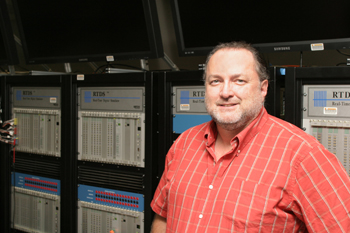
engineering and interim head of FSU's portion of the Florida Energy Systems Consortium
With $8.75 million in legislative funding, Florida State University is bringing together researchers from a variety of fields to develop new strategies for dealing with Florida’s energy challenges.
FSU’s initiative will be part of the new Florida Energy Systems Consortium, a collaborative effort among the state’s 11 public universities to address critical issues dealing with energy, climate and the environment, with a particular focus on promoting renewable energy. Florida Gov. Charlie Crist last month signed into law a comprehensive energy bill, HB-7135, that established the consortium and provided $50 million in funding to be divided among four core institutions — FSU, the University of Central Florida, the University of Florida and the University of South Florida.
“This is a wonderful opportunity for us to leverage all of the expertise that already exists on the FSU campus to get people from various fields working together toward solutions to the energy challenges facing our state,” said David Cartes, an associate professor of mechanical engineering and interim head of FSU’s portion of the Florida Energy Systems Consortium.
To that end, FSU intends to establish a new research and policy framework, tentatively known as the Institute for Energy Systems, Economics and Sustainability, or IESES (pronounced “Isis”), to unite researchers from such disparate disciplines as engineering, law, geography, economics, and urban and regional planning in efforts to address sustainability and alternative power issues.
“Creating a system of renewable energy involves far more than simply designing new technologies, although those are obviously central to the process,” Cartes said. “There also are numerous areas of the law involving energy production and environmental protections; economic effects on local communities and on the state’s poorest residents; and issues of where best to place power generation facilities, both in terms of maximum efficiency and of local planning needs, that have to be factored in.
“So in addition to performing research to develop new solar, biomass and other renewable energy technologies, we envision IESES being an even-handed, reliable source of information for the Florida Legislature and Governor’s Office,” Cartes said. “By that, I mean we will seek to provide balanced, objective economic and policy analysis to help our state’s elected leaders make informed choices about the best way to meet our future energy needs.”
 Professor J.B. Ruhl, who teaches environmental law at FSU, is one of the scholars who will contribute his expertise to IESES. Ruhl says that environmental considerations play a tremendous role in shaping Florida’s energy future.
Professor J.B. Ruhl, who teaches environmental law at FSU, is one of the scholars who will contribute his expertise to IESES. Ruhl says that environmental considerations play a tremendous role in shaping Florida’s energy future.
“The ‘sustainability’ component of IESES focuses our research on integrating new energy technologies with environmental and social policy concerns,” Ruhl said. “In particular, siting of new energy generation and distribution facilities will present the need to take ecological impacts into account. We want a secure energy foundation for the state, but not at the expense of our vital and unique natural resources.”
Meanwhile, Mark Isaac, the John & Hallie Quinn Eminent Scholar in FSU’s Department of Economics, will bring his economic expertise to the table in helping IESES develop policies that take into consideration the needs of the poorest members of society.
"My teaching ties rigorous economic analysis to concern for the poor," Isaac said. "Anything that increases energy prices is going to have an effect on the well-being of the poor, not only in the United States but around the world. Just look at the dislocation that our ‘green’ ethanol policies are having on food markets in developing countries. This is the type of unintended consequence that economists are particularly good at understanding but is not necessarily obvious to the students who will be staffing governments, firms and non-profits in the future."
Other existing resources that FSU will bring to the IESES table include the university’s Center for Advanced Power Systems (www.caps.fsu.edu), which conducts research to modernize the nation’s electric power grid, enhance its security and reliability and facilitate recovery from disruptions; its Sustainable Energy Science and Engineering Center (www.sesec.fsu.edu), which is developing innovative solutions to sustainable energy issues for consumers and industry; and its Center for Economic Forecasting and Analysis (www.cefa.fsu.edu) , which employs advanced, computer-based economic models to address pressing public-policy issues in various research areas.
Another objective for IESES will be creating an interdisciplinary curriculum in sustainable energy engineering and the sustainable energy economy.
"In addition to performing research and analysis, we have an obligation to produce a new generation of sustainable energy professionals who will become the educators, engineers, scientists, policymakers and planners of tomorrow," said Kirby Kemper, FSU’s vice president for Research. "Creating a more sustainable society will be a long-term endeavor, so we need to be sure we pass on this knowledge to those who come after us."




